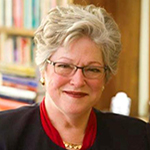By Molly T. Marshall
 In my last column I described the coming church as browner and poorer, more sensuous and feminine, less clerical and more collegial/inclusive, more attentive to the need for structural change than quick palliation, and more multilingual and polycentric. This perception garnered more than the usual tepid response to my postings. Oh, to be David Gushee, Amy Butler or Bill Leonard, with their multitude of followers!
In my last column I described the coming church as browner and poorer, more sensuous and feminine, less clerical and more collegial/inclusive, more attentive to the need for structural change than quick palliation, and more multilingual and polycentric. This perception garnered more than the usual tepid response to my postings. Oh, to be David Gushee, Amy Butler or Bill Leonard, with their multitude of followers!
I remain, nevertheless, the inveterate schoolmarm, and I plow pedantically on with further observations about the church that must come. So here is my sequel, which readers breathlessly await. These descriptors arise from my observations and longing, for the church has this really important role to play in our fractured world.
I believe that the coming church will be a better blend of youthful and senior, more liturgical, more theological, less bounded and more permeable, and less self-interested. I will exegete each of these in turn.
It will be more youthful and more senior. Recently I had the opportunity to lead a spring ministry conference at a well-known Cooperative Baptist Fellowship church. As we sorted out the context in which this urban church found itself, several in the room talked about the competition — a megachurch across town, teeming with young adults, hip music and great coffee. As we discussed why young adults would make their way to that congregation, one young leader observed: “Because they are listened to there.”
That was a telling remark, and the older among us took it in, realizing the truth spoken. The church must find a way to assist intergenerational work, for the future of the church depends upon a more intentional interface. The fastest growing segment of the population is those over 80 years of age, and retired persons have more time to devote to the work of the congregation.
The wise church will find a way to incorporate both young and older sectors, for we need each other. Younger adults do not have the patience for long apprenticeships in church leadership; indeed, the church needs their thoughts and energy now. Older adults will continue to provide historical memory, present mentoring, and a rich resource of time for the sustaining of congregational life. They will also learn from the fresh insight of younger congregants.
It will be more liturgical. Many grow more interested in the liturgical rhythms of the Christian year, for they offer a framework for the dynamism of discipleship and convey the development of doctrine. Baptists increasingly demonstrate eagerness to employ the lectionary, liturgical colors and the artistry that can stir the congregation to a more comprehensive experience of Christian identity.
We want to situate our discrete churches within the larger Body of Christ, and therefore we seek to align our proclamation and worship with the church catholic, which means universal. Thoughtful Baptist theologians understand the consequences of separatist origins, and they are re-visiting our distinctives to articulate what we contribute to the church universal.
It will be more theological. James McClendon described doctrine as “what the church needs to teach now in order to be the church.” This suggests continuing revelation and development rather than fixity we simply inscribe on the would-be faithful. As we enter into a time that has little patience with theological wordsmithing and obfuscating definition, there is still a need for a rich grammar for our faith. Persons want to know why Baptism and Eucharist are sacramental practices and what they mean; persons want to find ways to seek God in all of life; and, persons also want to be beckoned to lives of significance beyond maintaining an institution.
It will be less bounded and more permeable. Current analyses of the church suggest that “belonging” precedes believing and behaving. Many persons may participate for years in a congregation without the formal rite of “joining the church,” with the requisite “transfer of letter/membership” or baptism. “Belonging” through shared worship, missional activities, and concern for the well being of neighborhood or city, erodes the boundary of church membership.
Further, because God’s Spirit often finds greater receptivity to the pursuit of justice outside congregational life, we may have to broaden our understanding of what constitutes church. Permeable boundaries welcome the transgressive activity of the Spirit.
The coming church will be less self-interested. A few years ago, James Harnish charted the pathway to congregational renewal with these words: “You only have to die.” Intentionally dying to old patterns of church can be a sweeping expression of hospitality, and the lack of self-interest will create welcoming space.
So what if churches no longer look the same? Immigrants are contributing to what Stephen Warner calls “the de-Europeanization of American Christianity.” I believe this will prompt new vibrancy and creativity as the fusion of cultures ensues.
A new church is coming, and it will illumine how God is making all things new. As our ecclesial forebears contended, the church is ever being reformed.
